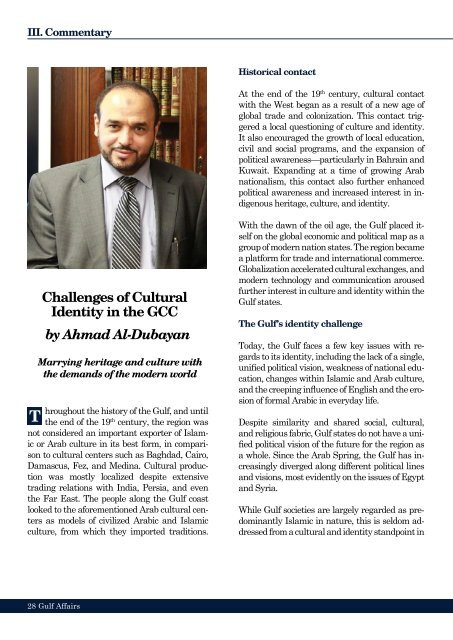You also want an ePaper? Increase the reach of your titles
YUMPU automatically turns print PDFs into web optimized ePapers that Google loves.
III. Commentary<br />
Historical contact<br />
At the end of the 19 th century, cultural contact<br />
with the West began as a result of a new age of<br />
global trade and colonization. This contact triggered<br />
a local questioning of culture and identity.<br />
It also encouraged the growth of local education,<br />
civil and social programs, and the expansion of<br />
political awareness—particularly in Bahrain and<br />
Kuwait. Expanding at a time of growing Arab<br />
nationalism, this contact also further enhanced<br />
political awareness and increased interest in indigenous<br />
heritage, culture, and identity.<br />
Challenges of Cultural<br />
<strong>Identity</strong> in the GCC<br />
by Ahmad Al-Dubayan<br />
Marrying heritage and culture with<br />
the demands of the modern world<br />
hroughout the history of the Gulf, and until<br />
the end of the 19 th century, the region was<br />
not considered an important exporter of Islamic<br />
or Arab culture in its best form, in comparison<br />
to cultural centers such as Baghdad, Cairo,<br />
Damascus, Fez, and Medina. Cultural production<br />
was mostly localized despite extensive<br />
trading relations with India, Persia, and even<br />
the Far East. The people along the Gulf coast<br />
looked to the aforementioned Arab cultural centers<br />
as models of civilized Arabic and Islamic<br />
culture, from which they imported traditions.<br />
With the dawn of the oil age, the Gulf placed itself<br />
on the global economic and political map as a<br />
group of modern nation states. The region became<br />
a platform for trade and international commerce.<br />
Globalization accelerated cultural exchanges, and<br />
modern technology and communication aroused<br />
further interest in culture and identity within the<br />
Gulf states.<br />
The Gulf’s identity challenge<br />
Today, the Gulf faces a few key issues with regards<br />
to its identity, including the lack of a single,<br />
unified political vision, weakness of national education,<br />
changes within Islamic and Arab culture,<br />
and the creeping influence of English and the erosion<br />
of formal Arabic in everyday life.<br />
Despite similarity and shared social, cultural,<br />
and religious fabric, Gulf states do not have a unified<br />
political vision of the future for the region as<br />
a whole. Since the Arab Spring, the Gulf has increasingly<br />
diverged along different political lines<br />
and visions, most evidently on the issues of Egypt<br />
and Syria.<br />
While Gulf societies are largely regarded as predominantly<br />
Islamic in nature, this is seldom addressed<br />
from a cultural and identity standpoint in<br />
28 Gulf Affairs


